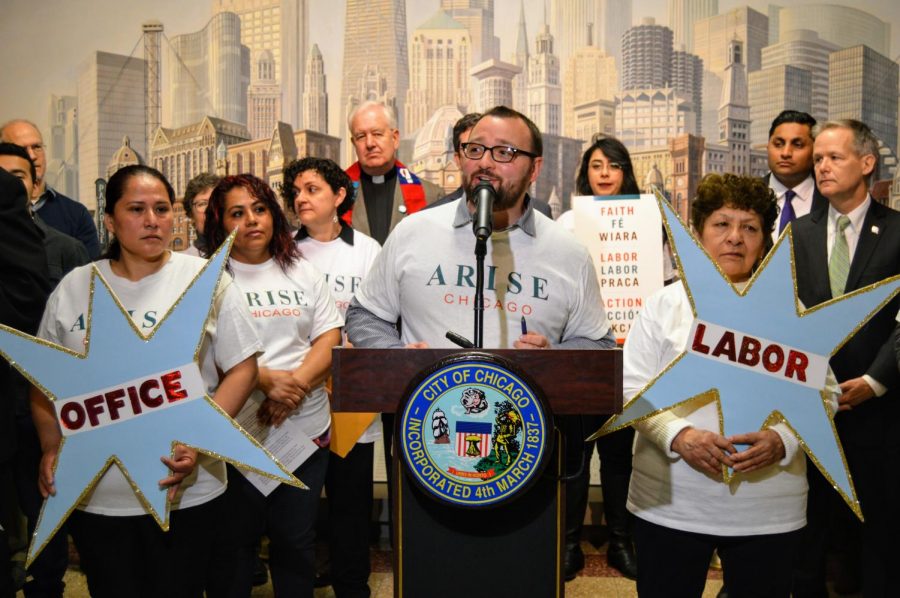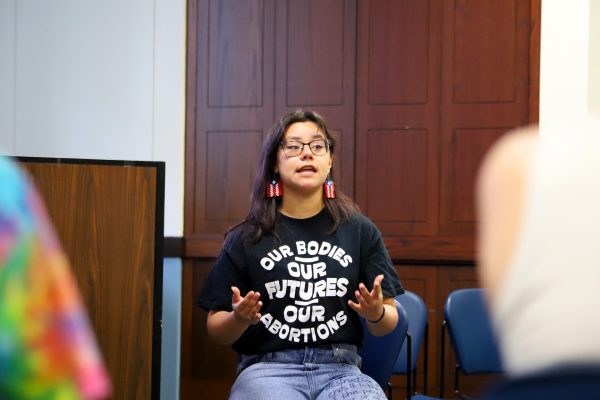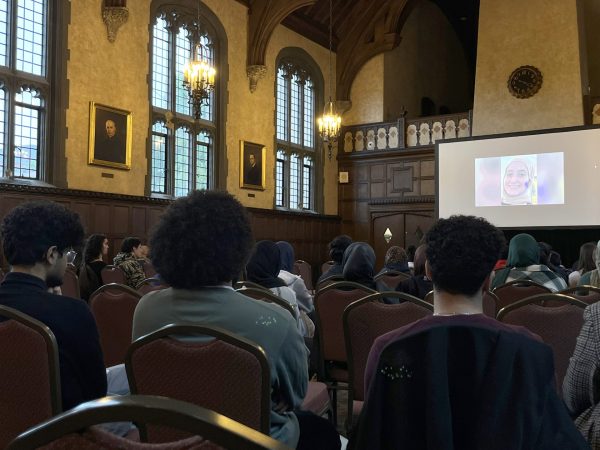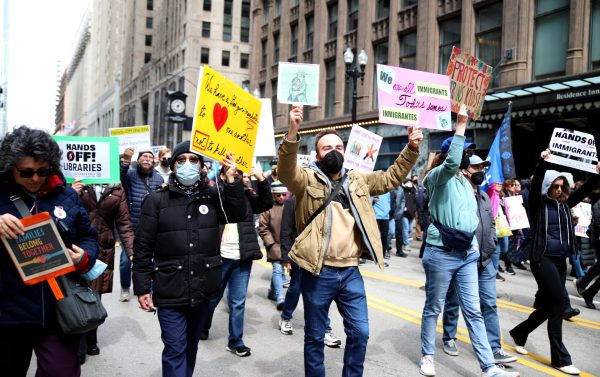City proposes new labor standards
Arise Chicago, a group of labor activists, has been at the forefront of passing Chicago’s minimum wage ordinance. (Shelly Ruzicka | ARISE Chicago)
Working college students look to Chicago’s minimum wage ordinance not only to ensure they’re making the legal minimum, but that the minimum can be raised as they continue working — it’s supposed to reach $13 an hour by 2019 from the $11 an hour it’s at now. However, lenient enforcement of this ordinance and others created to protect workers’ rights has left violating the law an almost consequence-free offense in the past few years. To this effect, data obtained by the Chicago Reporter shows that 75.3 percent of minimum wage complaints were not investigated between July 2015 and December 2016.
This is likely because when the minimum wage and other ordinances were passed, enforcement power was given to the city’s Business Affairs and Consumer Protection (BACP) department — but without allocating extra funding and staff to do so, according to Adam Kader, Worker Center Director at Arise Chicago. However, a new ordinance introduced at City Hall on Wednesday could change that.
The proposed Office of Labor Standards Ordinance would create an office within BACP specifically dedicated to enforcing the city’s laws on minimum wage, wage theft and paid sick days — all crucial protections for Chicago’s working class.

(Victoria Williamson | The DePaulia)
A product of support from 35 aldermen and the Arise Chicago worker center, the Office of Labor Standards (OLS) would add teeth and consequences to already existing Chicago law, making worker protections a reality. Aside from advising workers on their legal rights, Arise is focused on “worker-centered policy,” and helped pass all three of the previous ordinances the new office would enforce.
Kader said they hope to have about 20 staff members in the new office to start, while building up from there. The office would have a director as well as a combination of complaint investigators and attorneys.
Although BACP has some of these resources, the goal is to streamline the complaint process and move all resources under one umbrella to make enforcement more efficient and effective, according to supporting Alderman Ameya Pawar of the 47th Ward.
“This will make sure these workers have all the same rights that people in suits do,” Pawar said at a press conference Wednesday morning.
Pawar said he has partnered with Arise on all three of the ordinances the new office would enforce. “This is the logical conclusion to all of that work,” he said. “It doesn’t matter if we pass it if workers aren’t receiving those benefits.”
One helpful aspect of the new OLS would be its ability to act as a collecting agency, according to Pawar. This means that “if there is a complaint, we can collect those wages,” he said.
The proposed ordinance would authorize the director of the office to “receive, administer, pay over and distribute monies collected in and as a result of actions brought for violations of any law the director is empowered to enforce.”
According to a draft of the ordinance, the OLS would also have funding to ensure workers are both aware of their rights under the law and encouraged to report violations — which has not always been the case in the past.
The ordinance draft also outlines ways in which the office would encourage reporting violations. This includes keeping the employee’s name confidential, providing temporary monetary relief for employees when the director believes there’s been a wage violation and displaying physical forms on-site at businesses that notify their employees the OLS is conducting an investigation. The OLS would also keep and publicly post data on complaints, opened cases, employers repeating violations and more.
Alderman John Arena of the 45th Ward is another co-sponsor of the proposed OLS ordinance. He traveled to Seattle with Arise Chicago to see how the Office of Labor Standards operates there, in the hopes that a similar agency could successfully translate to Chicago. One of their biggest takeaways from the trip was how to work with community organizations on the ground in order to more effectively reach workers with their message.
“In this current climate where many low-wage workers, particularly immigrants, may not trust the federal government, it’s important for workers to connect with organizations they know and trust to connect with local government,” said Shelly Ruzicka, Communications Director at Arise.
Arise and co-sponsoring aldermen are also looking to other cities with an OLS, including New York and San Francisco, paying special attention to how those cities go about creating feasible budget plans for their offices based on the proportion of the city’s population to its number of workers.
Alderman James Cappleman of the 46th Ward also co-sponsored the ordinance. He said it is particularly important for college students. Cappleman’s father died when he was young, and with seven siblings he had to pay his own way through college without financial help from his mother. He says he worked part-time at a grocery store and lived in an apartment, where he managed to graduate in four years with no debt.
“At that time, you could work part-time and live in an apartment and go to school,” Cappleman said. “Those days are gone. The truth of the matter is, those at the bottom of the ladder, they were in a drought. It is long overdue that we start a trickle-up theory, and today starts that.”
When asked if Mayor Rahm Emanuel supports the proposed Office of Labor Standards, Pawar responded that he and other organizers anticipate Emanuel will work with them, as they currently have 35 supporting aldermen. Later that afternoon, Arise announced they had won support from 70 percent of the City Council.








Terence Bass / Aug 18, 2018 at 4:31 pm
I filed a complaint with the BACP on wage theft and after talking with the inspector the best he could do was find a technicality on why he cannot enforce. My former employer committed full wage theft and he cannot do anything even when the law defines wage theft,unacceptable!